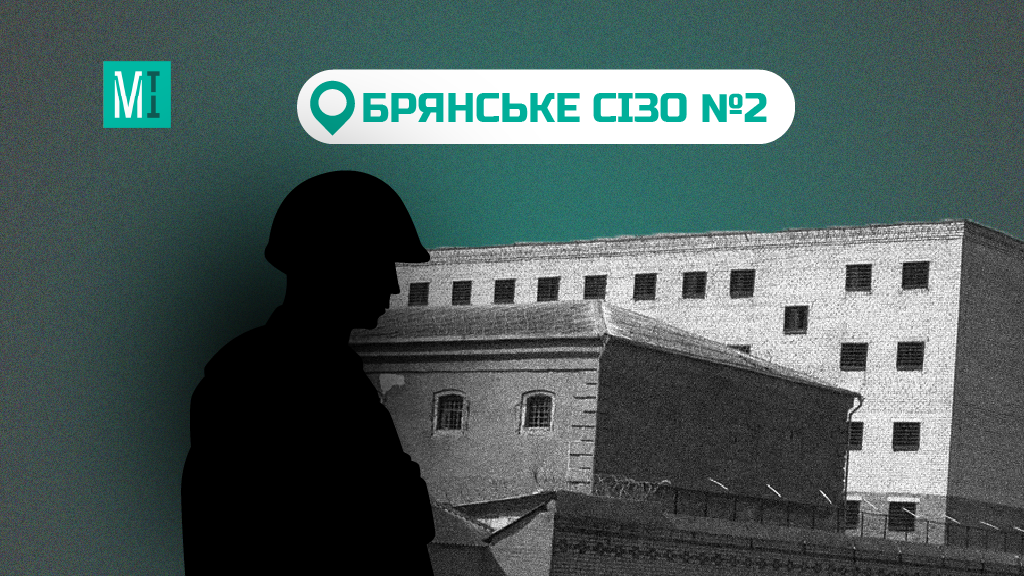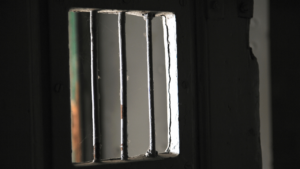Russia’s secret prison. Some 650 Ukrainians are being held in Pretrial Detention Facility No. 2 in Bryansk Region

A secret prison located in the town of Novozybkov, approximately 170 kilometers from Chernihiv in Bryansk Region, is currently holding around 650 Ukrainian prisoners of war and civilian hostages, most of whom were taken there in February and March 2022 during Russia’s occupation of Kyiv Region.
Despite evidence to the contrary, Russia denies that any Ukrainian citizens are being held in this facility. When a Russian human rights lawyer attempted to enter the pretrial detention facility at the request of the MIHR, they were denied access and told that there were no Ukrainian citizens being held there. The prison authorities refused to meet with the lawyer. The lawyer’s sources in Novozybkov have reported that hundreds of Ukrainians are currently being held in Pretrial Detention Facility No. 2. The lawyer also submitted a request to the Department of the Federal Penitentiary Service in Bryansk Region regarding Dmytro Khyliuk, a Ukrainian journalist who was abducted by the Russians and is being held in Pretrial Detention Facility No. 2. The authorities stated that they had no information regarding the whereabouts of Khyliuk. In response to the lawyer’s inquiries, the Investigative Committee of the Russian Federation stated that they have no information regarding any ongoing criminal proceedings against the journalist. However, witnesses who were interviewed by the MIHR claim that Dmytro Khyliuk is being held in Pretrial Detention Facility No. 2 in Novozybkov, which is a secret prison for Ukrainian hostages and prisoners of war.

The detainees from Kyiv Region were transported from Ukraine to Novozybkov via this route.
“Admission at the pretrial detention facility is tough and involves severe beatings that leave the person incapacitated for up to two weeks”
In all cases where Ukrainian citizens were detained in the occupied territories of Kyiv Region, they were first transported to Hostomel. At this location, the Russians had established a large detention center capable of holding up to 100 people, which was set up inside industrial refrigerators located near the airfield. Some stayed there for one night, others for much longer. “I was held in Hostomel for two weeks in refrigerated units with up to ten military personnel and approximately 80 civilians. They were from different age groups, some old, and I later encountered some of them in the Russian prison. For instance, Vasyl Vasiliovych, born in 1953, is still being held in Bryansk Pretrial Detention Facility No. 2. At the end of March, I was taken from Hostomel to Belarus, where I stayed for three days before getting registered at Bryansk Pretrial Detention Facility No. 2 on March 30,” Vladyslav, a Ukrainian serviceman released through a prisoner exchange, tells the MIHR (name changed at the request of the witness).

Bryansk Pretrial Detention Facility No. 2, Novozybkov
En route to Bryansk Pretrial Detention Facility No. 2, the escort personnel often inform the detainees of their destination. In some instances, the escort personnel have provided detailed explanations of what would happen after their arrival at the prison. “More than 30 of us were packed into a vehicle with a military police escort and an armed guard. During the trip, the guard provided instructions on what to expect upon arrival, such as the enforcers dragging detainees along the asphalt instead of helping them up if they fell from the vehicle, resulting in bloody knees. “The armed guard permitted us to raise our hats slightly as we stepped off the vehicle. One of the detainees, who had previously served time in a penal colony, remarked that the treatment in Bryansk Pretrial Detention Facility was comparable to that of death row inmates in Ukraine,” says Dmytro Levytskyi, a volunteer released through a prisoner exchange last year. The MIHR has already documented his story of abduction and subsequent detention in prison.
According to witness Oleksandr (name changed at the request of the witness), who was released through an exchange in May 2022, prisoners were forcibly removed from the vehicle and kicked towards the prison entrance: “We fell to the ground. The guards kicked us, ordering us to keep our heads down while their dogs barked and snarled… The dog would take a bit out of whoever gets close to it”.
According to former prisoner of war Vladyslav, the registration process at Bryansk Pretrial Detention Facility No. 2 was intentionally designed to intimidate new arrivals. “During the reception process, all of my ribs were broken, with one still visibly protruding. The beatings were severe and caused extensive bruising to our legs and ribs, but not to our heads. However, later in detention, we were subjected to head injuries as well. It took approximately a month for the injuries to heal, and I was unable to lie down or get out of bed during that time,” the man recalls.
Prisoners were processed with alarming speed, and following the initial beating, they were required to surrender their clothing and take a cold, 30-second shower. Subsequently, they were given a prison robe and rubber slippers before undergoing a medical examination.
“On March 23, we were taken from Dymer, and the following day we were transported from Hostomel to Belarus. On March 25, we arrived at the pretrial detention facility in Novozybkov, where we underwent a series of procedures, including a haircut, medical examination, blood tests, fluoroscopy, and fingerprinting, all of which were completed within an hour on the first day. The process was conducted swiftly, and in between the medical examination and fingerprinting, we were provided with a mattress, towel, bar of soap, toothbrush, and a small tube of toothpaste. We were also forced to film a video in which we pledged not to oppose the special military operation. Incidentally, the pretrial detention facility personnel informed us that ‘two to three weeks, and everything will be fine’,” says former hostage Dmytro Levytskyi.

Dmytro Khyliuk, a Ukrainian journalist being held by the Russians in Bryansk Detention Facility No. 2
The pretrial detention facility staff jumped to conclusions, as the hostages from Kyiv Region had been held there for nearly 11 months already. Apart from the journalist Dmytro Khyliuk, the secret prison also holds Yaroslav Hrokh, a former ATO soldier from Tolokun, Kyiv Region, whom the MIHR has previously reported on.
“The cells are subjected to daily searches, and the detainees are often subjected to kicks and blows to the ribs”
Upon completion of the registration process, the prisoners are allocated to various cells. Pretrial Detention Facility No. 2 in Novozybkov consists of two buildings, one with three floors and the other with five. Detainees are frequently transferred from one cell to another, from one floor to another, and even from one building to another. As a result, a person may be moved between 4-6 cells during their ten months of captivity.
The cells are relatively small and have varying capacity, with some designed for 2, 3, or 4 people, while others can hold up to 26 detainees. “Each cell is furnished with bunk beds, a toilet, a washbasin, a table, and two benches,” says Dmytro Levytskyi.

A cell for four inmates in Pretrial Detention Facility No. 2
“Each morning, I was rushed out of my cell for a search, during which a prison guard would tap on the walls with a hammer. The cells were inspected twice daily. We were awoken every day at 6 a.m. and forced to stand inside the cells for extended periods. The length of time we were required to stand varied depending on the floor we were on. We were often forced to stand all day with our heads down,” says former prisoner of war Vladyslav. The prisoners were frequently instructed to remain stationary inside their cells, with orders to refrain from movement. If any detainee disobeyed this command and attempted to move around, the enforcers would swiftly enter the cell and inflict physical punishment. Detainees were only granted a few minutes of respite during meal times, which were the only opportunities they had to sit down.
According to all the witnesses interviewed by the MIHR, enforcers frequently subject prisoners to physical assaults within Bryansk Pretrial Detention Facility No. 2. “While I was in a cell on the third floor, the enforcers would repeatedly kick us while wearing army boots and demand that we crouch down very low. The taller detainees who were unable to comply were subjected to even more severe punishment. Although we knew we would be beaten during inspections, we eventually became desensitized to the violence and no longer found it surprising or frightening,” says former prisoner of war Vladyslav. He further explains that the guards would inspect the mattresses once a week. During these checks, detainees were required to run down the corridor to a designated room with their belongings, where they were then instructed to undress and unroll their mattresses and shout: “Glory to Russia!” “During these mattress checks, the person in charge could hit a detainee with a pillow. Furthermore, whoever was the last to be inspected was at risk of being subjected to a stun gun,” Vladyslav recalls.
Mass beatings of prisoners would occasionally occur amid news from the front. As a result, prisoners learned of the Ukrainian Armed Forces’ precise targeting of Russian positions. “Without warning, they would rush in and unleash violent beatings upon us – seemingly as an act of retribution for their troops. On a particular occasion, as they pummeled us and shouted: “Khokhly, freaks, we made a gesture of goodwill by leaving Kyiv, while your Banderite fascists are shooting us in the back from balconies, bushes, and sewer manholes,” says former hostage Oleksandr.

Abducted by the Russian army, Yaroslav Hrokh is at Bryansk Pretrial Detention Facility No. 2 in Novozybkov.
Some prisoners were targeted more frequently during the beatings. This differential treatment stemmed from the enforcers possessing intelligence indicating that these particular civilians had served as coordinators for the Ukrainian Armed Forces. Among those who were especially mistreated were men with patriotic tattoos or those who had previously served in the Anti-Terrorist Operation.
Medical treatment in the Russian prison could be called that with a stretch. Although a doctor was available to dispense medication, prisoners were often left in the dark about the specific type of pill they were given. In the case of serious chronic illnesses such as diabetes, the doctor would administer insulin injections three times daily. However, injuries sustained during beatings were not treated. “After being beaten, some individuals experienced inflammation, which was typically treated with a pill that provided temporary pain relief. However, it did not offer a permanent cure,” says Vladyslav, a former inmate of Bryansk Pretrial Detention Facility No. 2. Dmytro Levytskyi reported that individuals with festering wounds were taken to the medical center to receive bandaging.

Corridor of the pretrial detention facility.
“During the morning check-up, a doctor was always present. If the enforcers beat us, they would call a doctor to provide medical care, including dispensing pills to alleviate any pain. In one particular incident, a young man was taken out of his cell and he vanished – it all began with his leg becoming severely swollen due to a beating and he began to experience worsening mental symptoms, likely due to inflammation. He was constantly receiving pills but was eventually taken from the cell and never returned, leaving us uncertain of his fate. It is possible that he did not receive adequate medical treatment and may have even died,” Vladyslav testifies.
“Never ending interrogations with the same questions. We were always hungry.”
At Bryansk Pretrial Detention Facility No. 2, the daily routine included a weekly visit to the bathhouse, during which prisoners were taken individually to the showers under close supervision. Infrequently, prisoners were permitted brief outdoor walks lasting no longer than 5-7 minutes. While the prison in Novozybkov served three daily meals, the servings were extremely small. According to some witnesses, the lunch – comprising soup, stew, and a piece of bread – could fit in half an aluminum mug. “Breakfast consisted of milk porridge – such as semolina or oatmeal. For lunch, prisoners were typically served soup, such as cabbage soup or a type of ‘pink soup’ that was referred to as borscht. The second dish for lunch was potato stew. For dinner, prisoners were sometimes served pasta. Once a week, a special treat was offered in the form of fried or steamed herring,” says former captive Vladyslav. Prisoner rations at Bryansk Pretrial Detention Facility No. 2 were only recently increased in the last few months. Previously, prisoners were given only half a scoop of porridge or soup, but since the end of August, they have been receiving a full scoop.
“We went to bed hungry and woke up hungry. In just two months of captivity, I lost 18 kg in weight,” former captive Oleksandr told the MIHR in an interview.

Food at the pretrial detention facility.
Hunger is an ever-present sensation for those incarcerated in Russian prisons, and this is true not just for those held at Bryansk Pretrial Detention Facility No. 2. Prisoners at Pretrial Detention Facility No. 2 in Taganrog are likewise subjected to meager rations, causing them to become weak. According to former prisoner Vladyslav, due to food shortages, prisoners frequently reminisce about their favorite meals and dishes from home in Ukraine, often discussing what they ate or cooked before being incarcerated.
Interrogations are a critical and distressing aspect of the prisoners’ unbearable existence at Bryansk Pretrial Detention Facility No. 2. Prisoners are frequently taken to special interrogation rooms where they are questioned by either balaclava-wearing representatives of the Russian special services who refuse to identify themselves, or military prosecutors who may introduce themselves and provide an interrogation report for the prisoner to sign. The same prisoner may be subjected to three or four interrogations per day by different interrogators, particularly if they are of special interest to the Russian authorities. Some prisoners may only be interrogated during the first two weeks of their imprisonment at the secret prison, after which they are left untouched.
“I was questioned about the location of ammunition and fuel depots, my affiliations with the Azov Battalion and Anti-Terrorist Operation fighters. The interrogators expressed great concern about the Azov Battalion, which they considered a terrorist organization, and they also gathered personal information about my family and relatives. The first day was particularly grueling, but six months later, a dispassionate student interrogated me for only seven minutes before letting me sign the protocol”, says former prisoner of war Vladyslav.

Dmytro Levytskyi was held at Bryansk Pretrial Detention Facility No. 2
Dmytro Levytskyi has observed that during interrogations, the same questions are asked repeatedly, likely in an attempt to catch prisoners in a lie. “The first three interrogations all consisted of the same questions regarding my affiliations with the military, Azov Battalion fighters, volunteer battalion members, Nazis. They kept asking the same questions every time,” Levytskyi recalls, adding: “At times, the interrogators would also inquire whether we were nationalists. Many replied that they had no idea what this was about and that they were simply defending their country from invasion and aggression, and therefore, perhaps they were nationalists.”
Witnesses interviewed by the MIHR reported that prisoners were not subjected to physical torture during interrogations, and on occasion, were even offered tea. Bryansk Pretrial Detention Facility No. 2 places a great emphasis on propaganda, forcing prisoners to sing the Russian national anthem and chant slogans every morning: “Glory to Russia!” Prisoners are frequently subjected to derogatory labels, such as “fascists” and “Nazis” and are often coerced into refraining from speaking Ukrainian. “He (the guard) would open the cell door peep hole and say ‘Speak Russian, Russian’,” Dmytro Levytskyi says. According to his account, a TV set broadcasting Russian programs is circulated from cell to cell, and the guards subsequently quiz prisoners about what they saw and heard on the news – insisting on retelling of the news.
Television access has been significantly reduced recently. According to a man who was released in January 2023 as part of a prisoner exchange and spoke with the MIHR. He reports that prisoners are now forced to watch TV once or twice a month. According to former prisoner Oleksandr, the TV programs were not broadcasted live. Instead, propaganda programs were recorded on a flash drive and shown to the prisoners on the TV.
Prison staff attempt to persuade prisoners that Ukraine no longer exists and that its armed forces have been vanquished in the war with Russia. Moreover, they coerce prisoners into signing statements disavowing any desire to be exchanged. “Many refused to be exchanged and were subsequently transferred to other prisons. Some had come from Crimea and Kherson to Kyiv Region. The Russians falsely claimed that exchanging them would be equivalent to trading one Russian citizen for another. Additionally, they made false claims that Kyiv had been bombed and no longer existed, using fear tactics to coerce individuals into believing that they had no choice but to accept Russian citizenship and employment offers. Some detainees succumbed to these pressures, but I knew it was a lie,” says former captive Oleksandr.
Every prisoner in Bryansk Pretrial Detention Facility No. 2 shares the same dream of being released through a prisoner exchange and returning to Ukraine. However, due to the frequent shuffling of prisoners between cells, floors, and buildings, it is nearly impossible to know who and when will be selected for exchange.
Natalia Bohuta, MIHR






